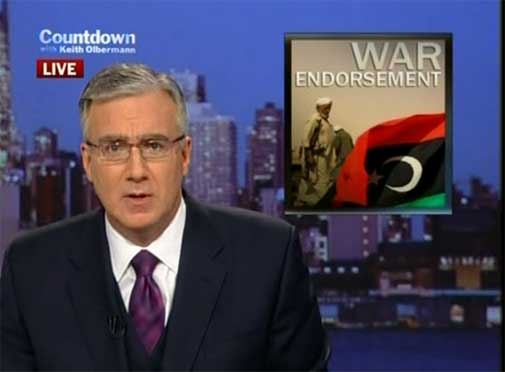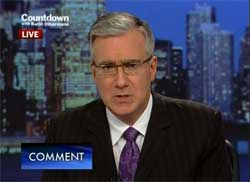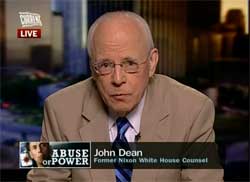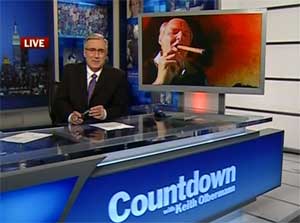
If there's a sharper, more passionate writer than Keith Olbermann working in television news today -- someone who wields the raw power of nouns and verbs better than he does -- I don't know who it is.
Olbermann, whose second incarnation of Countdown with Keith Olbermann premiered June 20 on Current TV, has something else, too. When he's got his best game on, he's among that tiny minority of communicators with physical features, personality traits, intellectual attributes, mechanical skills and a certain something no one can define that let him project his image and voice through an electronic transmission system and juice up the emotions of viewers and listeners when his digitized self appears on their video screens.

All that stipulated, I also can not name anyone else in the field who is a more tangled rat's nest of contradictions than the furious, anti-corporate, populist outsider who has become a multi-millionaire servicing the profit motives of Capital Cities/ABC, the Walt Disney Company, Microsoft, General Electric and even the News Corporation of Rupert Murdoch, a.k.a. media's Prince of Darkness.
Olbermann's latest home, Current Media LLC, is a privately held, for-profit entity co-founded by a Nobel Peace Prize-winning, Oscar-awarded documentarian with 24 years in the U.S. Congress and the vice presidency of the United States (but not, by the skin of his radiant teeth, the U.S. presidency). Albert Arnold Gore Jr.'s fellow Currenters include a complement of senior executives with roots in and connections to Viacom, Hewlett-Packard, Booz Allen Hamilton, etc., etc., etc.
All due respect, anti-corporate populist outsiders they ain't.
And that doesn't even count Comcast, the 10-percent investor in Current and the media omnivore that just swallowed NBC/Universal, including MSNBC. Olbermann fled from MSNBC last January just before the Comcast takeover closed. Among other reasons, there was a suggestion that he worried the new guys might slap content restrictions on his show.
So, fine. If he's going to play in the big leagues, he has to work for somebody who owns a team.
As to the games themselves, Olbermann has tried to tamp down ratings expectations. In a brief conference call with reporters the Friday before launch week, Olbermann said what everybody on the line already knew: All the characterizations of his early ratings, whether by competitors or by Current TV itself, would be, he said, "bullshit."
Not being an advertiser or an investor, I don't really care what ratings Countdown gets, but I do wonder about an appropriate measure of success for Olbermann and the show.
Day to day, of course, experience and instinct will tell him and his production team whether they did a good show: what worked, what didn't work, what should have worked better.

The first week was heavy on the latter.
Most consistent, it seemed to me, were the hyper-drive openings and news summaries, replete with Olbermannic kickers. Most inconsistent were the follow-up interview/analysis segments. Olbermann pulled good material out of John Dean, Ken Vogel, Andy Kroll and Jonathan Turley, but a fair number of segments went nowhere. Sometimes the problem was the interviewee (say, Rep. James Clyburn, Janeane Garofalo, Anita Dunn), and sometimes it was the interviewer (i.e. Olbermann with Matt Taibbi and Matthew Hoh).
Olbermann's signature bits were more uneven still, although they smoothed out as the week wore on.
"Special Comments," for example, didn't hit its stride until Thursday's mostly quiet but insightful piece on gay marriage.

"The Most Worstest Person of the Day Ever in the Universe" (whatever) struggled even more. On Monday, Olbermann nailed a young New York commuter who was shown on video trying and failing miserably to salvage a shred of dignity after she was chastised by a train conductor for disturbing passengers with loud profanity during a cell phone call.
Forget that the woman looked awfully small compared to the day's other contenders: Sarah Palin and Fox News' Chris Wallace. Forget that the video felt like pandering to Olbermann's legions of web-centric fans. Forget, even, that nobody really knew what happened in the time before and after a fellow passenger caught her between "record" and "stop" on his smart phone.
Olbermann fared better later in the week when he remembered that American politics is a target-rich environment for shaming and mockery and that populists are better advised to look up, not down, for their raw material. When he did, he found an abundance of apt honorees, including a babbling Rick Santorum, a clueless Georgia state legislator, and recurring targets Rush Limbaugh and Glenn Beck.
Even so, it's mystifying that Olbermann didn't get around to worsting Supreme Court Justice Antonin Scalia, who authored a 5-4 majority opinion last week telling 1.5 million American women to take a hike. They didn't have enough in common, Scalia wrote, to sue Wal-Mart Stores Inc. as a unified class of plaintiffs.
Apparently, the charge that current and former female employees of the world's largest retailer were paid less than male employees wasn't unifying enough. Neither was the charge that their promotions were fewer and fell shorter than those of their male counterparts. Nor was the charge that the monster-truck culture of the Arkansas-founded behemoth subjected female employees to more taunts, leers, nicknames and butt grabs than male employees could ever dream of.
Instead, Scalia and his four fellow corporateers stood unified in defense of Wal-Mart. And its $405 billion in 2010 revenue. And all of Big Corporate America. Against working Americans. AGAIN. (This stuff almost writes itself, once you get going!)

Specifics aside, the question remains: If not ratings, by what measure should we judge the success of Olbermann's Countdown on Current. Households with access to the channel? Ad revenue? Web traffic? Blog posts? Social media action? Corporate (gasp!) profitability?
Politics is the metier of the show, as Olbermann might put it, so isn't political influence a reasonable standard of success? Was Countdown on MSNBC a player in the national political conversation? Can Countdown on Current be? Jon Stewart's The Daily Show certainly is, although I couldn't point to a Nielsen stat to prove it. Is there a clear path to relevance and influence?
In the early 1990s, HBO was starting to break out of the isolation of pay cabledom and into the mainstream of American popular culture. One of its most effective tools was something called "quality noise." Bob Cooper, who ran HBO's original movies operation, explained at the time that "quality noise" included word of mouth, critical buzz, distinctiveness from what the competition was doing, and a hard-to-pin-down sense that if you missed, say, the Josephine Baker film or the Stalin miniseries (or, much later, The Sopranos, Entourage or Curb Your Enthusiasm), you'd feel out of it.
The media universe was expanding when HBO made its move 20 years ago, and it still is. But there's infinitely more noise now than there was then, and few would argue that "quality" has much to do with it.
Even so, Olbermann still has to generate word of mouth and demonstrate distinctiveness. He still has to show he has something of value to add to the public policy discussion.
It has to be more than an artfully written, astutely delivered stew of fact-based bile and bombast. It has to be more than echo-chamber validation of progressive values and arguments. What he says also has to matter somehow.
That's Olbermann's real challenge.
--
Eric Mink -- ericmink1@gmail.com -- most recently was the Op-Ed editor and columnist for the St. Louis Post-Dispatch. He previously covered television and media for the Post-Dispatch and the New York Daily News. Mink now teaches film studies at Webster University in St. Louis and provides writing and editing services to independent clients.